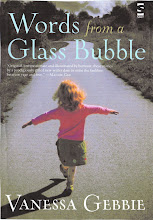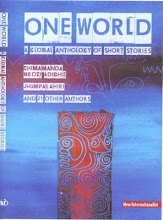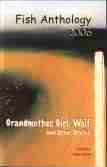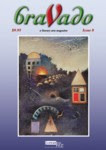Well, I can't tell you how many books Salt Publishing has been midwife to, over the years. A lot.
And it is extraordinary, extraordinary...to see that there are a few familiar books in their All-Time Bestseller list, posted this week on their website.
The White Road and other Stories by Tania Hershman
Some New Ambush by Carys Davies
Words from a Glass Bubble by Vanessa Gebbie
Showing posts with label The White Road and other Stories. Show all posts
Showing posts with label The White Road and other Stories. Show all posts
Monday, 10 August 2009
Tuesday, 7 April 2009
Tania Hershman - commended by Orange Prize judges

hey! My mate Tania Hershman, fellow Salt author and altogether lovely lady, has been commended by the judges of The Orange Prize!
"We were deeply impressed by the tremendous quality of this year's new writers," said Mishal Husain, BBC World News presenter and Chair of judges, "it was a very competitive field and therefore an excruciating process to choose just three of the 80 books we read. The shortlist we eventually decided upon reflects the dynamism and diversity of the entries, showcasing three authors with very different voices but an outstanding talent. We believe their extraordinary novels will appeal to a wide range of readers and also inspire the writers of tomorrow."
She continues," We would also like to commend two other authors, Tania Hershman and CE Morgan, whose work stood out for its remarkable quality. We look forward to seeing more of their writing in the future."
Tania's short story collection The White Road and other Stories is a remarkable book. And it is extra specially lovely to know that the judges have commended a short story collection!

This is the best best thing! I am moved, excited, and nearly squashed my lunch sandwich into the keyboard! Well done Tania, and here are many many many heartfelt congratulations.
Vxx
Sunday, 9 November 2008
THE WHITE ROAD AND OTHER STORIES: TANIA HERSHMAN


What links a café in Antarctica, a factory for producing electronic tracking tags and a casino where gamblers can wager their shoes? They're among the multiple venues where award-winning writer Tania Hershman sets her unique tales in this spellbinding debut collection.
So says Tania's blurb, on the Salt Publishing website.
I am delighted to be the next stop in her Cyclone Blog Tour, and my subject is one very dear to my own heart...
MAGICAL REALISM IN THE WHITE ROAD
Hi Tania!
I remember the first time I read your work. It was a tiny flash piece called Plaits, and I am delighted to see it included in The White Road and other Stories. I know I responded to that piece with both delight and understanding. Here was another writer who 'saw things a bit differently', to put it in the simplest of terms.
Many of your characters seem to inhabit a recognisable world, but you endow them with the skill to transcend it. And the reader is transported with them. In Plaits, we believe totally that a relationship hangs on the length of a woman's hair, and that her knees are her confidantes - advisors.
In the title story, we believe totally that a simple woman would go literally to the ends of the earth to escape the deepest of sadnesses. And we believe that the action she takes towards the end of the story is real. (I don't want to do a spoiler!).
And it is so with so many of your stories. Not for a moment do I doubt the 'truth' that underpins each story.
Three multiple questions:
1) Can you tell me whether your work fits broadly into the school of Magical Realism? If so can you define it as you see it, and give us a few examples of Magical Realist writers who have influenced your work??
First, thank you, Vanessa, for that wonderful introduction. It means a lot that you find my stories believable, you are willing to step into the worlds of my characters and accept what happens there as their “truth”.
I do love Magical Realism and I would like to see some of my stories as falling under this heading. I think that the name, Magical Realism, is already thrilling – you are taking something which we might call “real” and add a dash of magic, something otherworldly. For me, this is why I read – I want to be lifted out of the everyday, out of the world I know, and be shown something new, something other.
I do want to mention, though, that only some of the stories in my book would be called magical realist, and that this isn't something I set out consciously to do. Much like you, I imagine, I just follow where the story leads me. If, as happened with the story Rainstiffness, I hear the first line in my head: “When it rains, she stiffens”, I just go with it and am not put off, made nervous by the fact that actually my main character is semi-paralyzed during rainstorms, something I have not heard of happening in “real life”. Many of my stories are far more realist, whatever that means, some are perhaps more in the science fiction realm – not realist enough to be even magical realism. What I am trying to say is that I believe in doing whatever serves a particular story, rather than setting out to write a piece of magical realism. I follow my characters, see what they do, see why they do it, and if it is something odd, something bizarre, something otherwordly – such as a rabbi meeting an angel in a car park, or two small boys who are afraid that one of them is going to explode - I am open to that. I would like to think I am open to anything my characters might do!
So what exactly is magical realism? I looked up several definitions: the most basic is that it is realism with a twist. This means there is some overlap with science fiction, speculative fiction, slipstream – but this is fiction firmly set in the world as we know it, not on other worlds or planets. The “magic” may only be something like, as you mentioned, a story in which a woman has conversations with her knees or, in your wonderful story, Words from a Glass Bubble, the talking statue of the Virgin Mary. Or, as in Like Water for Chocolate, by Laura Esquivel, a rather grander example in which food has an effect on the eater depending upon the emotions of the cook.
I like to read magical realist stories because they make me think more than a story in which every element is familiar. I am not particularly interested in a story about someone like me, who lives where I live, does what I do. I want to learn something from a story, and one way to draw me in as a reader is to invent something completely new! If you convince me, I will step into that world, I will accept it all, I will be right there with your characters. If you don't convince me, I stop reading.
Some of my favourite writers in this vein are Angela Carter, Aimee Bender, Italo Calvino, Hariko Murakami, Jose Saramago. These writers inspire and influence me by saying that anything is possible. Their work says to me: Don't be constrained by what you have seen, what you have experienced. Go beyond your world, use your imagination, see what might be, what could be.
This is not done simply for entertainment value: the best magical realist stories use the magical aspects to unveil something about our own world, our communities and societies, who we are as human beings. In Aimee Bender's beautiful story Dearth, from her collection Willful Creatures, a woman comes to love potatoes that grow hands and feet. This is an achingly moving story about loneliness and connection, attachment and loss. It is not about animate vegetables.
2) Why is Magical Realism effective? What does it do that straight realistic storytelling can't do? My take is that it leads the reader to see life through a prism, and makes them look back at simple events and reappraise thanks to the new layer of 'sight' the writer lends them. And that post-reading, the reader is left with something that resonates. Things are never quite as predictable afterwards. Debate!
Exactly! Oh sorry, does “debate” mean I have to disagree? Well, if you take the example I gave above, Bender could have attempted a story with a similar theme by showing us how lonely her main character was and having her trying to have a baby, find a boyfriend, something “mundane”, something familiar to most of us. By freeing us from the bonds of our world and asking us to accept that the potatoes can acquire human attributes, what she does is release something in us. She forces us out of our comfort zone, asking us to stretch our imagination “muscle”, flex it and exercise it. A well-toned imagination muscle gives us something, perhaps what you called a new layer of “sight”. We see the magical in the everyday, we are open to other possibilities, we are less rigid.
This discussion has led me to thinking about some of the wondrous books I read as a child: the Phoenix and the Carpet by E Nesbit was one of my favourites. So much of children's fiction could, I think, fall under the Magical Realist heading: our world, plus the addition of a talking phoenix and a magic carpet. I devoured these books, I loved the idea of the magical, and why should we grow out of that? The success of television series such as Heroes is a clear demonstration that we long for there to be more to this life, answers to the unexplainable, delight and wonder, untapped potential deep inside all of us.
3) Do you think that Magical Realism has anything to do with our innate search to explain the unexplainable? Does it go back to the dawn of time, when people sat round their fires and sought to explain the movement of the sun moon and stars through explaining those movements in 'Realistic' stories, thereby creating a mix of fantastical and familiar, all that time ago? You are a scientist by training. One might think that the search for fact would negate the very magical elements that come out in your work. How do you reconcile the two?
Most definitely. One of the definitions I found for magical realism said, when talking about Gabriel Garcia Marquez, one of the leading magical realist authors: “Magical realism expands the categorizes of the real so as to encompass myth, magic and other extraordinary phenomena in Nature or experience.” Many see magical realism as having Latin American roots, although it has now spread further afield. Yes, I see it as coming from a desire to understand, to explain the world around us, to fill in the gaps.
And this could equally be a description of science, no? Science is about explanation, understanding. And much of science requires scientists to suspend their disbelief, to accept the existence of the unseen, phenomena we cannot touch or feel. For example, quantum physics postulates that our tangible physical world is in fact mostly subatomic particles whizzing around in empty space. That doesn't fit with what our hands, our eyes are telling us.
Particle physics, which I studied at university, always felt to me like some type of science fiction: we can't “see” any of the particles the physicists believe exist – quarks, neutrinos, the Higgs boson - they are too small to be measured by any of today's instrumentation. We can only follow their trails through our world and see where they might have been and what effects they caused.
Scientists use their imagination to “probe” below the surface. How much more imaginative can you get than String Theory: we are all fundamentally made of tiny vibrating strings! But science is based on experimentation and proof, so it is not just enough to have a theory, you must design experiments to attempt to prove or disprove it. Well, actually, nothing can ever be proven to be true: in science there is no absolute truth: there is only the “best fit theory” that has yet to be proved wrong. I also studied Philosophy of Science and was deeply impressed by the logical argument about White Swans and Black Swans: just because up until this point in your life you have only seen White Swans, don't assume Black Swans don't exist. What a healthy attitude towards all of life: expect the unexpected, don't assume you know it all, have seen it all.
Scientists are always searching for the Theory of Everything, the “rules” which will completely explain our world, but all along the road is the debris of theories that were once believed and then proved wrong. Science is dynamic, always on the move, creative, magical. Scientist are always asking “What if...?”. So do fiction writers. Just pick up a copy of New Scientist, for example. Some of the reports on the research that is being carried out sounds more like fiction than fact!
Studying physics taught me that curiosity is a virtue, that asking questions is vital. I may not have continued on into a career in the lab, but I hope I never stop wondering, never stop asking questions.
Thank you so much for having me on your blog and asking me questions!
Next stop on the Virtual Book Tour: Nov 18th, Sue Guiney's Blog
Previous stops on the tour: Literary Minded
, Keeper of the Snails
For more information about Tania's Walking the White Road Virtual book tour, visit HERE!

Sunday, 26 October 2008
New Scientist
It was great to see New Scientist, the publication that inspired many of the stories in Tania Hershman's collection The White Road and Other Stories, featuring the book on their website HERE.
As you can see, they were wonderfully generous, and included the whole of the title story in their feature.
It was very interesting to see the reaction of a few readers, those who, one assumes, do not have much contact with fiction. (That may be wrong, but do go and read a few comments... complaining about the lack of grammar in the story, narrated by a woman who runs a cafe in the Antarctic.)
And of course, there have been a few posts in reply gently pointing out that creative writing is creative!
I first met Tania at an event hosted by Lab Lit, an initiative that seeks to bring scientists and writers together. In an extraordinarily generous move, scientists in all disciplines have put themselves on a searchable database and are open to talking with writers who want to explore their particular field of research and use it in some way in their writing. Lab Lit website HERE, including a review of The White Road...
Lab Lit set up this initiative to encourage exploration of science in fiction. To bring together artists and scientists. I suppose it was not improbable that there would be conservative elements (forgive the pun) on both sides, perhaps, who would not see the positive outcomes in the move.
Perhaps the scientific community were expecting realist portrayals, with educated characters only? I doubt it. The scientists we met at that first event were open and interested in what the writers might do...
But it is very interesting to see the clash of art and science, albeit in a small way, acted out on the New Scientist website.
As you can see, they were wonderfully generous, and included the whole of the title story in their feature.
It was very interesting to see the reaction of a few readers, those who, one assumes, do not have much contact with fiction. (That may be wrong, but do go and read a few comments... complaining about the lack of grammar in the story, narrated by a woman who runs a cafe in the Antarctic.)
And of course, there have been a few posts in reply gently pointing out that creative writing is creative!
I first met Tania at an event hosted by Lab Lit, an initiative that seeks to bring scientists and writers together. In an extraordinarily generous move, scientists in all disciplines have put themselves on a searchable database and are open to talking with writers who want to explore their particular field of research and use it in some way in their writing. Lab Lit website HERE, including a review of The White Road...
Lab Lit set up this initiative to encourage exploration of science in fiction. To bring together artists and scientists. I suppose it was not improbable that there would be conservative elements (forgive the pun) on both sides, perhaps, who would not see the positive outcomes in the move.
Perhaps the scientific community were expecting realist portrayals, with educated characters only? I doubt it. The scientists we met at that first event were open and interested in what the writers might do...
But it is very interesting to see the clash of art and science, albeit in a small way, acted out on the New Scientist website.
Saturday, 30 August 2008
LOOK WHAT'S ON MY DESK...

Look, it's on my desk!!! It arrived this morning! THE WHITE ROAD!
The most fabulous collection, this one. A mix of short stories and flash fiction, many inspired by quotes from scientific journals.
And I've planted a tree! For every copy sold a tree will be planted, thanks to Eco Libris.
Saturday, 26 July 2008
TANIA HERSHMAN – THE WHITE ROAD AND OTHER STORIES

Finally! After what seems an age, this debut collection from a most intriguing writer has its own webpage, we can see the cover, read the blurb.
I was sitting with the author Tania Hershman in Anam Cara Writers' and Artist's Retreat in Ireland when the email came through to say that Salt wanted to publish this book... and I remember the joy of that moment. That was last year, June, I think...
Due out on September 1st 2008 now, (which will make this one eligible for the Frank O'Connor award next year) The White Road and Other Stories contains several stories I know well. And others I don't.
What makes Tania such an interesting writer is her 'take ' on things. We chimed straight away when we 'met' in cyberspace, she having taken First Prize in a flash fiction comp, and me trailing in second... I emailed her to say how much I loved her winning story. ('Plaits'... included in this collection)
So here you go. Here are the blurb, and Tania's bio from the web page. And a mug shot, for good measure!

Main description: What links a café in Antarctica, a factory for producing electronic tracking tags and a casino where gamblers can wager their shoes? They're among the multiple venues where award-winning writer Tania Hershman sets her unique tales in this spellbinding debut collection.
Fleeing from tragedy, a bereaved mother opens a cafe on the road to the South Pole. A town which has always suffered extreme cold enjoys sudden warmth. A stranger starts plaiting a young woman's hair. A rabbi comes face to face with an angel in a car park. An elderly woman explains to her young carer what pregnancy used to mean before science took over. A middle-aged housewife overcomes a fear of technology to save her best friend. A desperate childless woman resorts to extreme measures to adopt. A young man's potential is instantly snuffed out by Nature's whims. A lonely widow bakes cakes in the shape of test tubes and DNA.
A number of these stories are inspired by articles from science magazines, taking fact as their starting points and wondering what might happen if . . .? In these surreal, lyrical stories, many of which are only a few pages long, Tania Hershman allows her imagination free reign, as her characters navigate through love, death, friendship, spirituality, mental illness and the havoc wreaked by the weather.

Author Bio: Tania Hershman was born in London and in 1994 moved to Jerusalem, where she now lives with her partner. She is a former science journalist and her award-winning short stories combine her two loves: fiction and science. Many of Tania Hershman’s stories, which have been broadcast on BBC Radio 4 and published in print and online, are inspired by articles from popular science magazines. In November 2007, she founded The Short Review, a unique website dedicated to reviewing short story collections, which attracts several hundred visitors a week.
THE WHITE ROAD AND OTHER STORIES INFO HERE
Concerned about the environmental impact of her book, Tania is partnering with Eco-Libris, who will plant a tree for every copy. For further information, visit Tania’s website: www.taniahershman.com.
Subscribe to:
Posts (Atom)




.JPG)





















